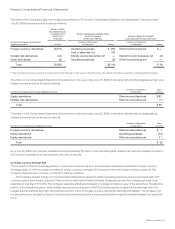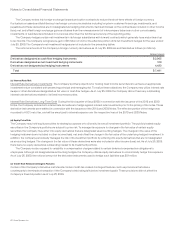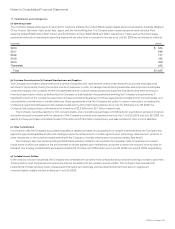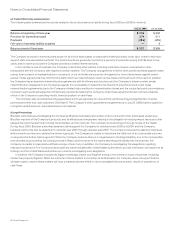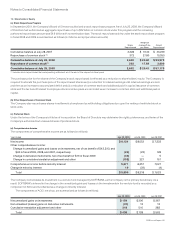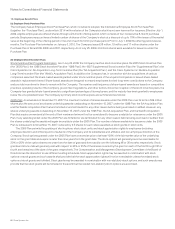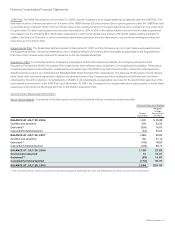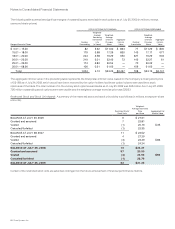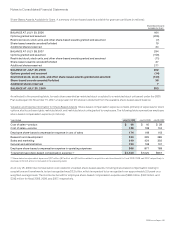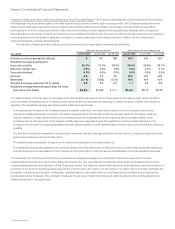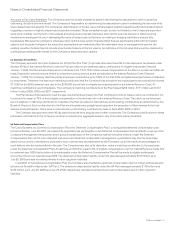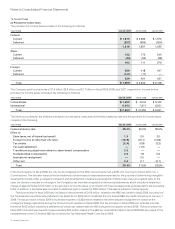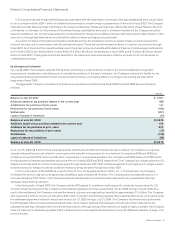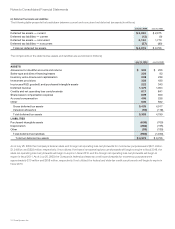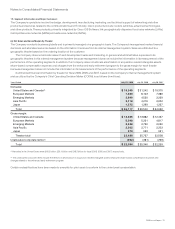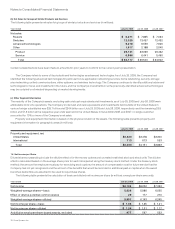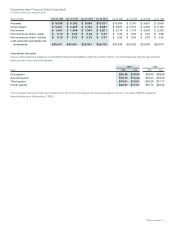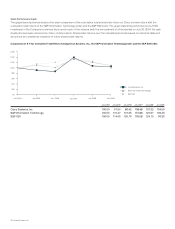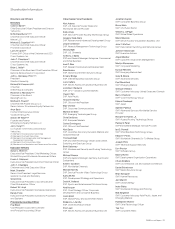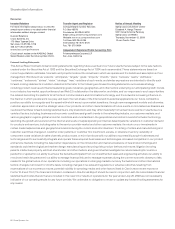Cisco 2009 Annual Report Download - page 73
Download and view the complete annual report
Please find page 73 of the 2009 Cisco annual report below. You can navigate through the pages in the report by either clicking on the pages listed below, or by using the keyword search tool below to find specific information within the annual report.
Notes to Consolidated Financial Statements
Accuracy of Fair Value Estimates The Company uses third-party analyses to assist in developing the assumptions used in, as well as
calibrating, its lattice-binomial model. The Company is responsible for determining the assumptions used in estimating the fair value of its
share-based payment awards. The Company’s determination of the fair value of share-based payment awards is affected by assumptions
regarding a number of highly complex and subjective variables. These variables include, but are not limited to, the Company’s expected
stock price volatility over the term of the awards and actual and projected employee stock option exercise behaviors. Option-pricing
models were developed for use in estimating the value of traded options that have no vesting or hedging restrictions and are fully
transferable. Because the Company’s employee stock options have certain characteristics that are significantly different from traded
options, and because changes in the subjective assumptions can materially affect the estimated value, in management’s opinion, the
existing valuation models may not provide an accurate measure of the fair value or be indicative of the fair value that would be observed in
a willing buyer/willing seller market for the Company’s employee stock options.
(c) Employee 401(k) Plans
The Company sponsors the Cisco Systems, Inc. 401(k) Plan (the “Plan”) to provide retirement benefits for its employees. As allowed under
Section 401(k) of the Internal Revenue Code, the Plan provides for tax-deferred salary contributions for eligible employees. Effective
January 1, 2009, the Plan allows employees to contribute from 1% to 75% of their annual compensation to the Plan on a pretax and after-tax
basis. Employee contributions are limited to a maximum annual amount as set periodically by the Internal Revenue Code. Effective
January 1, 2009, the Company matches pretax employee contributions up to 100% of the first 4.5% of eligible earnings that are contributed
by employees. Therefore, the maximum matching contribution that the Company may allocate to each participant’s account will not exceed
$11,025 for the 2009 calendar year due to the $245,000 annual limit on eligible earnings imposed by the Internal Revenue Code. All
matching contributions vest immediately. The Company’s matching contributions to the Plan totaled $202 million, $171 million, and $131
million in fiscal 2009, 2008, and 2007, respectively.
The Plan allows employees who meet the age requirements and reach the Plan contribution limits to make a catch-up contribution not
to exceed the lesser of 75% of their eligible compensation or the limit set forth in the Internal Revenue Code. The catch-up contributions
are not eligible for matching contributions. In addition, the Plan provides for discretionary profit-sharing contributions as determined by the
Board of Directors. Such contributions to the Plan are allocated among eligible participants in the proportion of their salaries to the total
salaries of all participants. There were no discretionary profit-sharing contributions made in fiscal 2009, 2008, or 2007.
The Company also sponsors other 401(k) plans that arose from acquisitions of other companies. The Company’s contributions to these
plans were not material to the Company on either an individual or aggregate basis for any of the fiscal years presented.
(d) Deferred Compensation Plans
The Cisco Systems, Inc. Deferred Compensation Plan (the “Deferred Compensation Plan”), a nonqualified deferred compensation plan,
became effective June 25, 2007. As required by applicable law, participation in the Deferred Compensation Plan is limited to a group of the
Company’s management employees, which group includes each of the Company’s named executive officers. Under the Deferred
Compensation Plan, which is an unfunded and unsecured deferred compensation arrangement, a participant may elect to defer base
salary, bonus, and/or commissions, pursuant to such rules as may be established by the Company, up to the maximum percentages for
each deferral election as described in the plan. The Company may also, at its discretion, make a matching contribution to the employee
under the Deferred Compensation Plan. A matching contribution equal to 4% of eligible compensation over the Internal Revenue Code limit
for calendar year 2009 that is deferred by participants under the Deferred Compensation Plan will be made to eligible participants’
accounts at the end of calendar year 2009. The deferred compensation liability under this plan was approximately $100 million as of
July 25, 2009 and was recorded primarily in other long-term liabilities.
In addition to the Deferred Compensation Plan, the Company also maintains a deferred compensation plan for certain employees and
directors of Scientific-Atlanta (the “SA Plan”). The deferred compensation liability under the SA Plan was approximately $118 million and
$126 million, as of July 25, 2009 and July 26, 2008, respectively, and was recorded in accrued compensation and in other long-term
liabilities.
2009 Annual Report 71


